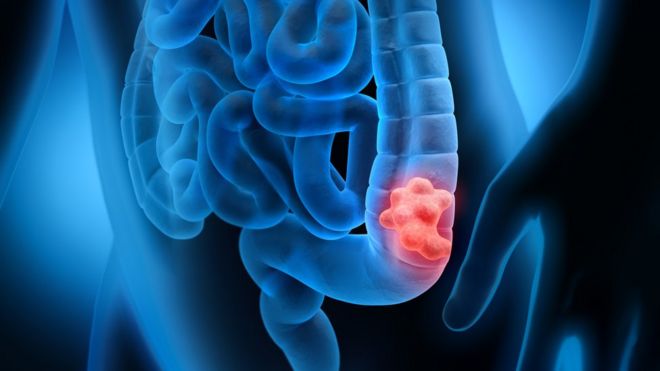 GETTY IMAGES
GETTY IMAGES
A common type of gut bacterium may increase a person's chance of developing bowel cancer, according to a study published in the journal Nature.
The bacterium is a type of E. coli infection, present in up to one in five people, scientists believe.
It releases a toxin which experts say can damage the cells that line the bowel, potentially turning some cells cancerous over time.
There are around 42,000 new cases of bowel cancer each year in the UK.
Experts do not yet know how many of these might be linked to the E. coli strain that makes the toxin colibactin.
- Bowel cancer rates rising 'among young adults'
- Dame Julie Walters reveals shock of bowel cancer diagnosis
How dangerous might it be?
The researchers suspect it may contribute to a minority of bowel cancer cases - one in 20 or five in every 100 - but more research is needed to confirm the link.
There is no routine test for the bacterium currently, and it is not clear yet that people who have it will be at heightened risk.
In some people it may live in the bowel and cause no issue.
It is not the first infection to be linked with cancer, however. HPV is a virus that causes cervical cancer and H pylori infection is associated with stomach cancer.
Is it the same as food poisoning?
No. This particular E. coli strain is not one of the ones linked to food poisoning outbreaks.
There are lots of different types of E. coli. Many are part of the normal gut flora - the trillions of bacteria that naturally live in the bowel.
What did the study find?
The team, from The Netherlands, the UK and the US, used miniature replicas of the human gut, grown in the lab, to test the effects of the toxin on cells.
They then compared the damage seen with more than 5,000 bowel cancer samples taken from patients and found identical patterns or "fingerprints" of DNA damage in around 5% of the samples.

What are bowel cancer symptoms?
- a persistent change in bowel habit - going more often, with looser stools and sometimes tummy pain
- blood in the stools without other symptoms, such as piles
- abdominal pain, discomfort or bloating always brought on by eating - sometimes resulting in a reduction in the amount of food eaten and weight loss
Most people with these symptoms do not have bowel cancer, but the NHS advice is to see your GP if you have one or more of the symptoms and they have persisted for more than four weeks.
Source: NHS UK

How do the findings help us?
Experts say it may be possible to develop a more sensitive test to detect early bowel tumours using this knowledge about the toxin.
The findings may also offer a way to prevent some bowel cancers, by getting rid of the bacterium from the body before it can do any harm, using existing antibiotics.
One of the researchers, Prof Hans Clevers, from the Hubrecht Institute in The Netherlands, said: "Common antibiotics will kill these bacteria.
"This is the first time we've seen such a distinctive pattern of DNA damage in bowel cancer, which has been caused by a bacterium that lives in our gut."
He said there may be other gut bacteria that do the same.
Probiotic treatments that contain a similar strain of E. coli, called Nissle 1917, might also pose a risk potentially, he added - but these are not the same ones found in yoghurt drinks sold in supermarkets.
"Although it might sound scary, there's still lots left to understand about our how our gut bacteria affect our health, what we could do about it, and how much impact it has on bowel cancer risk," says Nicola Smith, senior health information Manager at Cancer Research UK, who funded the work.
"In the future, knowing what role bacteria in our gut plays could change the way we detect and prevent bowel cancer.
"But we do know that around half of bowel cancer cases can be prevented by not smoking, keeping a healthy weight and eating a balanced diet - so there's plenty of changes that you can make right now that will reduce your risk," she added.
Genevieve Edwards, chief executive at Bowel Cancer UK, said: "Although this research is at an early stage, it adds to the growing body of evidence about the role that bacteria and other microorganisms that live in our gut may play in bowel cancer development. "
https://www.bbc.com/news/health-51626946